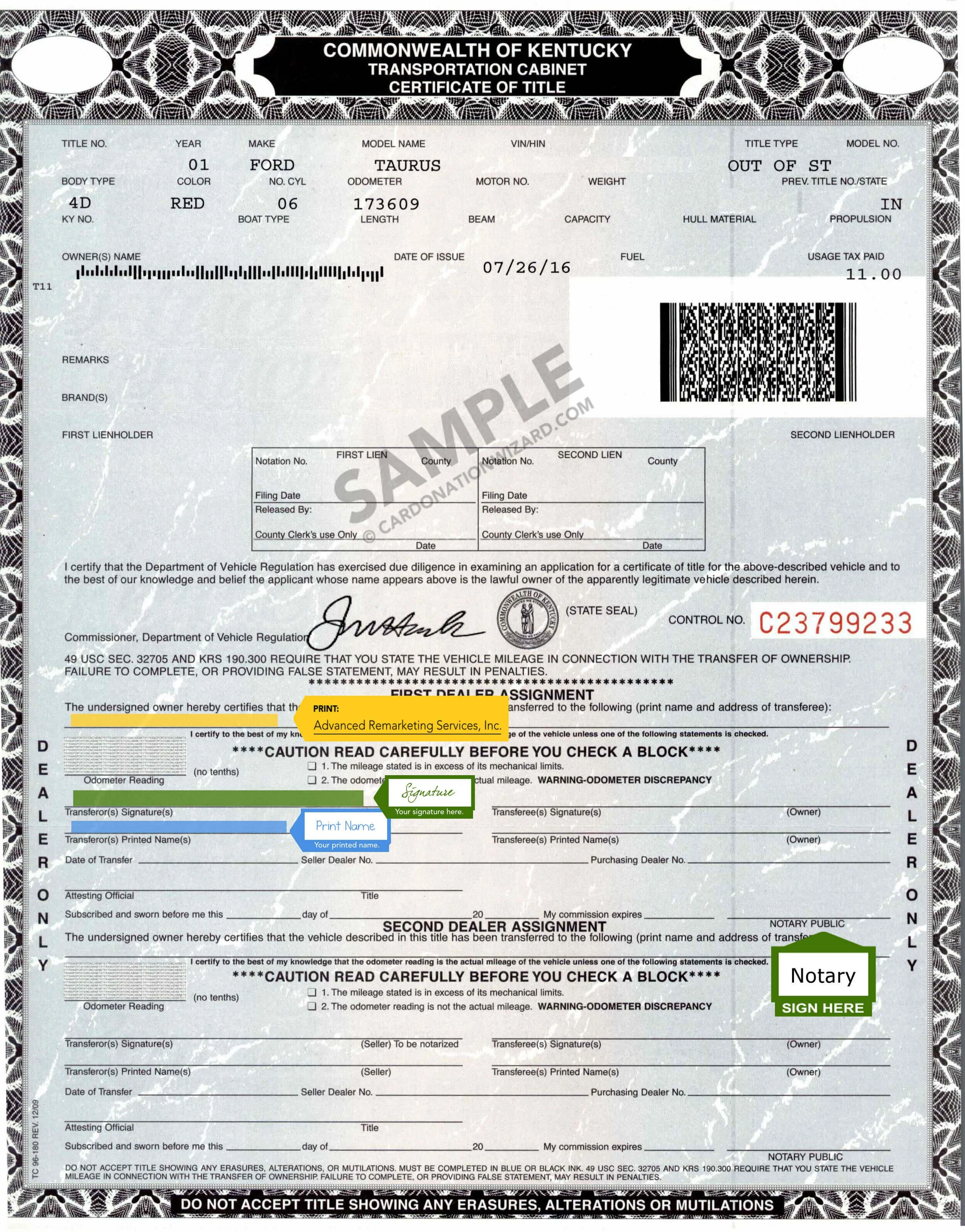This seemingly innocent event causes some serious issues down the road and is expressly illegal if you get caught doing it. But people do it all the time, so what’s the big deal?
Transferring a car title without signing it, otherwise known as floating a title, is actually a criminal offense called title jumping. When someone doesn’t assign the vehicle title properly after a sale, the title remains open and isn’t signed or dated by the buyer. The seller is thereby allowing the buyer to skip out on taxes and fees. The situation is exacerbated if multiple successive owners float the title over a period of months or even years.
No matter what you call this act, it’s illegal – in some states it’s even a felony.
You can avoid getting involved in title floating by running a cursory VIN Check on any vehicle you plan to buy. If the data on the VIN Check matches the data presented by the seller, and if the seller’s name matches on their ID and on the title, you can be confident that you are avoiding getting caught up in a title floating headache.
Floating a car title might not seem like a big deal. Many people don’t realize that it leads to headaches for everyone involved.
How Does Floating a Car Title Work?
When a title is floated, the seller signs off on their part, but they leave a blank where they should fill in the buyer’s information and date of sale. This might be the choice of the buyer, the choice of the seller, or a persuasion by either party. The buyer is now able to resell the car without ever paying taxes or fees for having bought it. Furthermore, the buyer never gets put on the record of ownership.
When a title is floated, the buyer:
Is never on record as having owned the car, opening the door to numerous scams
Can sell the car without paying taxes or fees on it
Can drive the car without registration – tickets or citations could be sent to the previous owner
When this person goes to sell the vehicle, they just have the next person sign the title in the buyer’s section – where they should have signed long ago. This new buyer could now be stuck with excess taxes or late registration fees if the state ever discovers what happened, perhaps due to a mismatch on the personal property tax records of the parties involved.
How Does Someone Get Caught Floating a Car Title?
A person could get caught floating a title due to a mismatch in the personal property tax records of the parties involved. If the original seller stopped claiming the car on their taxes in 2017 but the car wasn’t registered in someone else’s name until 2021, someone has stolen tax money, registration fees, and other income sources directly from the state. And the state doesn’t like getting scammed.
To combat title floating, some states require that you get the title notarized while buying the car. This reduces the chances of floating a title, but it also means you have to wait weeks before you get a new car title. Of course, in states like California and Hawaii, new buyers get the title the same day so it makes flipping cars much easier. Scammers will take advantage of inexperienced car buyers who don’t know about the notary requirement, furthering the issue of floating titles and introducing criminal elements into the mix.
How Does Floating a Title Harm the Seller?
If you title jump a vehicle without first transferring it into your name, you put yourself at risk. Many states require that you transfer the title into your name within a certain number of days of buying the car, and if you sell a car with an open title, the buyer might not do that. They could wait months or even years to transfer the title.
As far as the state is concerned, the seller is still responsible for the taxes and registration fees during that time because their name is the only one involved. If that person then decides not to transfer the title at all before selling the car again, they were never actually the legal owner of the vehicle.
Potential risks include fines, penalties and jail time for both the original seller and the interim owner who never titled the car in their name. In reality, that’s just the start of what could become a spiral of legal fees and he-said-she-said arguments between however many parties transferred the title without ever registering it, all hanging on whether or not the state – or a law-abiding buyer down the road – realizes what has happened.
How Does Floating a Title Harm the Buyer?
If you buy a vehicle with a floated title, the person you bought from isn’t listed on the title. That may lead to numerous headaches:
There may be a lien or salvage claim not listed on the title
The odometer may have been tampered with or the car itself damaged
The vehicle’s true history could be a mystery – how many owners has it really had?
The seller could be hard to reach or could disappear altogether
If you can’t find the original titled owner, which is common, then you have an even bigger mess. You then ask yourself what reason someone would have for disappearing from the picture – often shortly before something goes catastrophically wrong with the car.
I’m a Victim of Title Floating – Now What?
Regardless of how you arrived at this moment, the unfortunate truth is that you are in a tough position. Let’s break this down based on who you bought the car from.
Private party. If you purchased from a private seller who is not the owner listed on the title, in other words you bought a car from someone floating the title, the best course of action is to retain all documents associated with the sale (bill of sale, copy of the seller’s photo ID, phone numbers, and so forth) and explain your situation to the DMV. This might result in extra fees on your part, but you won’t be committing a crime by dodging the fees or fabricating a story. The DMV will assess the situation and determine the next steps on a case-by-case basis.
Car dealership. If you purchased the car from a dealership, ask them to correct the issue. If they refuse to help or dodge the question, it’s time to file a claim against their business so they don’t continue to do this to customers. Of course, you always have the option to ask for your money back. This would avoid any headache at all, but you would have to go right back to buying a car again. Escalate the situation at your discretion.
Online. If you bought a car online and it arrived with a jumped title, most web-based services have resources to ensure the buyer and seller are not up to no good. You may have defenses built into your agreement with the platform. Contact their customer service team to ask what steps you should take.
Especially if you were scammed with some other aspect of the sale or the car itself, regardless of where you bought it from there is the possibility of taking legal action, but you need to be prepared to spend more money and lots of time. Overall, most people don’t go this route because of those factors. Your best move may be to speak to an attorney if your concerns are this serious. We are not attorneys and this article is not legal advice.
Protect Yourself from Sellers Floating the Title
The best way to avoid a floated car title is by running a cursory VIN Check before buying the car. This minimal investment will help you determine that the seller you’re dealing with is the legal owner of the car. Here are some other practices to help you avoid this common scamming technique.
Don’t Ask for an Open Title
If you buy a car without signing and dating the title, especially if you ask for the owner’s permission to do so, you are committing a crime which is considered a felony in some states. You don’t need to be an attorney to know that’s a bad idea.
Match the Seller’s ID to the Title
Before turning over any money, ask to see their ID. Then, compare it with the title to ensure they match. If they don’t, or the person isn’t willing to show you, then you need to walk away.
Be Diligent in Your Research
Don’t just believe their story about the title. You’ll hear it all – that they are selling it for their sister or their brother’s cousin’s aunt. What you don’t know is that you might be purchasing a car with a lien, salvage title or even worse, one that’s been stolen. Any of these scenarios will bite you in the long run.
Empower Yourself: Walk Away
If you suspect a title is being floated, don’t be afraid to walk away from the deal. Most car buyers aren’t looking at rare vehicles, so it’s likely there’s another one for sale right around the corner. You might think it’s a good deal, but what will happen later? Put in a little extra time to find another car and save yourself the hassle.
Need Help From a Title Specialist?
Nothing gets our blood boiling more than seeing someone get ripped off. Our title specialists are committed and dedicated to helping people every day in situations similar to the ones discussed in this article.
The best thing we can recommend is that you use our VIN Check before buying a car. This helps you purchase with confidence by revealing theft reports, liens, salvage claims and more so you can walk away from the sale if necessary. If you find yourself needing a new title, we can do that, too.
We are not attorneys. This article is not legal advice. Cover image source

















The act of transferring a car with an open title, some states classify title jumping as a felony.